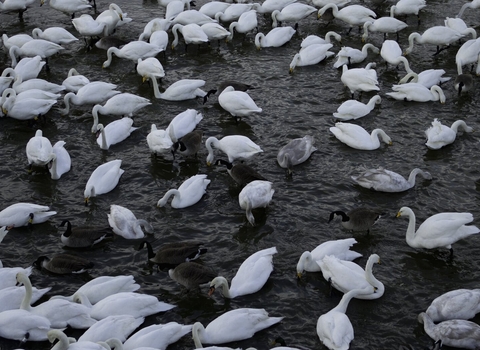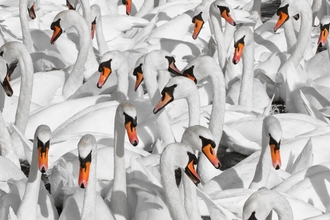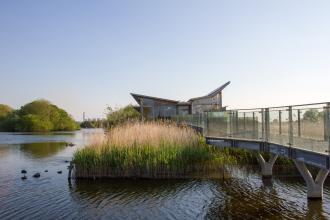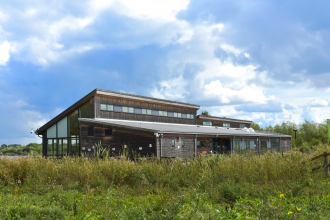Attenborough Nature Reserve – Avian Flu Update March 2023
The UK continues to be affected by the largest ever avian flu pandemic, with cases in both farmed and wild birds being recorded across the country.
Whilst we are no longer dealing with a major outbreak at Attenborough Nature Reserve, there have been a small number of bird deaths (not sufficient to trigger official testing) recently which we must assume are linked to the epidemic. Our team are working hard to limit the likelihood of further spread and you can help by continuing to not feed the birds. To limit disturbance to wildlife which is already under stress, and to keep pets safe from contact with wild birds, we are also asking that people keep dogs on short leads whilst visiting the reserve.
Attenborough Nature Reserve – Avian Flu Update February 2023
Following news that the current worldwide Avian Influenza outbreak is the largest ever and shows no sign of ending, Nottinghamshire Wildlife Trust has re-issued a plea to visitors to Attenborough Nature Reserve, its most popular site, not to feed the birds.
Attenborough Nature Reserve – Avian Flu Update 16th August 2022
Test results have confirmed that the significant number of recent bird deaths at Attenborough Nature Reserve are the result of an outbreak of Avian Flu.
Managing the outbreak has been extremely stressful for the staff dealing with dead and distressed birds on a daily basis and has also placed additional strain on staff and volunteers dealing with understandably concerned visitors and supporters.
Whilst not over, the impact of the outbreak thankfully seems to be slowing. However, the team remain vigilant and ready to deal with cases. There are a number of common sense steps, such as not feeding the birds and keeping dogs on leads, which visitors can take to help us keep our wildlife and the public safe whilst enjoying this much loved site.
As avian flu has been confirmed on site, visitors are no longer required to report cases of dead birds. However, as we are in the midst of an unprecedented series of outbreaks across the UK, people should continue to use the DEFRA helpline (03459 33 55 77) to report possible cases elsewhere.
Our team continue to deal with cases of dead and distressed birds during regular checks across the reserve, but please be aware that our capacity to deal with sick and injured birds is limited. Staff dealing with affected birds must have appropriate training and access to specific safety equipment. During the outbreak we have also been unable to call upon the help of the local wildlife rescue services that provide such wonderful support throughout the year. We are also aware that a number of rescue services are extremely stretched dealing with the impact of the recent heatwave on local wildlife. Agencies with the necessary training and equipment, such as the RSPCA, are also currently facing unprecedented demands on their services.
Nottinghamshire Wildlife Trust would like to thank visitors and supporters for their continued support at this stressful time. We would also like to thank our Local MP Darren Henry and his office for their assistance in speeding up the response from DEFRA at a key stage during the incident. We would also like to reiterate that both the nature reserve and nature centre remain open as the risk to humans from Avian Flu remains very low if people follow good hygiene such as washing hands regularly.
Stay Wild and Stay Safe.
Avian Flu Update for visitors and supporters August 1st 2022
Since the turn of the year the UK has been dealing with an unprecedented number of Avian Flu cases - with restrictions affecting domestic birds and worrying reports of impacts on wild birds.
In recent months there have been several confirmed cases in domestic and commercial poultry locally and a number of parks and nature reserves across Nottinghamshire and neighbouring counties have sadly experienced outbreaks.
Suspected outbreak at Attenborough Nature Reserve–July 2022
Over the past 10 days we have been dealing with a suspected outbreak of Avian Flu. Our team has dealt with over 150 dead birds so far, though numbers seem to be slowing.
Whilst we are still awaiting confirmation from DEFRA that we are dealing with Avian Flu, we are taking the situation extremely seriously.
Read more information from DEFRA
Our team are collecting carcasses and dealing with distressed birds as quickly as possible – but please be aware that there may be some unavoidable delays due to the size of the reserve, number of birds affected and the availability of trained staff and equipment such as boats.
We have also fenced off the approach to the Nature Centre (which remains open) as a precaution to discourage bird feeding and limit opportunities for contact between birds and people.
This incident has been traumatic for everyone connected with the reserve and we would like to thank visitors and the wider community for their support, patience and understanding and at this difficult time.
You can help
There are a number of ways you can help at this difficult time:
Reporting Dead Birds
You should call the Defra helpline (03459 33 55 77) if you find:
- one or more dead bird of prey or owl
- 3 or more dead gulls or wild waterfowl (swans, geese and ducks)
- 5 or more dead birds of any species
Sick and Injured Birds
Sick and Injured birds should be reported to the RSPCA on 0300 1234 999
Further information on dealing with sick and injured birds at this time can be found at rspca.org.uk/adviceandwelfare/diseases
Please don't feed the birds
As an additional measure to prevent birds congregating whilst being fed by visitors we are asking people not to feed birds at our reserves whilst Avian Flu cases are high. We recognise that people enjoy feeding the birds, especially children and families, but believe that the current situation requires a cautionary approach. Whilst providing a welcome treat, supplementary feeding is not essential for our reserve’s wild birds. We have temporarily suspended the sale of bird corn from our visitor centres.
Dogs on leads
Please keep your dog on a lead to limit the chance of contact with birds and remember to wash your hands regularly.
Poultry or other bird owners
Of you keep poultry or other birds, wash your hands and clean and disinfect footwear before tending to your own birds if you have visited the reserve.
Staying safe
The risk of the outbreak to human health remains very low, but you should avoiding contact with birds, feathers etc and wash your hands regularly.




